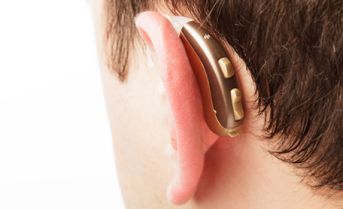Loss of hearing examples and diagnosis of this disease may be mild, moderate, severe, or serious.
What is Loss of Hearing?
Loss of hearing refers to the failure to hear the matter, to a certain degree or all together. Ageing and chronic exposure to loud sounds is an important factor that contributes to hearing loss. Other factors, such as excessive diapers, can prevent your ears from time to time to make sounds as needed. Hearing damage can be caused by many different causes, some of which can be treated with a successful drug or surgery, depending on the disease process.

As the name suggests, a sudden hearing loss may occur suddenly or develop within a few hours, and it affects the inner ear. The level of hearing abruptly depends on certain health factors. The effects of hearing loss suddenly range from light to severe, and potentially permanent. If symptoms persist for a long time, only hearing aids can provide effective relief.
Loss of hearing examples and diagnosis
A sensorineural hearing loss is the most common type of hearing loss. It remains and is due either to damage to the cells such as small hair in the inner ear or the hearing nerves.
Hearing nerve brings important information about the violence, the field and the meaning of the sound to the brain.
Most adults with hearing loss have the sensorineural loss. Sensorineural hearing loss can often cause difficulty understanding sound or speech even if it is strong enough to be heard.
The conductive hearing loss is because of mechanical problems in the middle or middle ear or barrier in earplugs such as the ear wax that prevents the noise from eardrums. It can stay, but more often, it is temporary and can be treated medically.
Mixed hearing effects occur when sensorineural and conductive hearing loss components are present.
Symptoms of loss of hearing
Ear pressure is the first sign of sudden sensorineural hearing loss. Symptoms usually occur once or after days, often in one ear. The severity of the symptoms may differ significantly. In the worst case scenario, deafness may be possible.
The most common symptoms include:
- The occurrence of hearing loss without a recognizable cause
- The absence of an earache
- Hearing loss in only one ear
The accompanying symptoms include:
- Dizziness
- Loss of sensation in the outer ear
- Ear pressure
- Tinnitus
How can hearing loss happen?
Some causes of hearing loss include:
- Damage to the inner ear. Ageing and exposure to noise can cause wear and tear on the hair or nerve cells in the cochlea that send sound signals to the brain. When the hair or nerve cells are damaged or lost, electrical signals are not transmitted efficiently, and hearing loss occurs. Higher tone tones may become muted to you. It may be difficult for you to choose words against background noise. The offspring may make you more likely to change it. This is known as the sensorineural hearing loss.
- A gradual buildup of earwax. Earwax can block the ear canal and prevent conduction of sound waves. This can be restored with earwax removal.
- Ear infection and abnormal bone growths or tumors. In the outer or middle ear, any of these can cause hearing loss.
- Ruptured eardrum. Loud blasts of noise, sudden changes in pressure, poking your eardrum with an object and infection can cause your eardrum to rupture and affect your hearing.
Which doctor treats loss of hearing?
According to current medical standards, a diagnosis of sudden hearing loss is determined through the process of elimination. Your ENT specialist can use ear microscopy and a hearing test to ascertain whether you have a sudden hearing loss or another illness. If you have a sudden hearing loss, especially in one ear, take immediate medical attention. Talk to your doctor if hearing difficulties interfere with your daily life. Your hearing may have declined if:
- Sounds seem muffled
- You find yourself having to turn the volume higher when you listen to music, the radio or television
- You find that it’s harder to understand everything that’s said in conversation, especially when there’s background noise
Earlier you start treatment, the better the prognosis. In a best-case scenario, you can see an ENT specialist within the first 24 hours of noticing signs of a hearing issue and get help right away. Treatment involves stimulation of the inner ear’s circulation and the elimination of possible triggers.
Treatments for Loss of Hearing or Deafness
There many support available for patients with all types of hearing loss. Treatment depends on why the deafness exists and how severe it is. The sensorineural hearing loss is incurable. If hair cells in the cochlea are damaged, they cannot be repaired. However, various treatments and strategies can help improve the patient’s quality of life. Between treatment that can be done are hearing aids, cochlear implants, sign language and lip reading.9
There are many types of hearing aids, and they come in various circuits, sizes, power levels. Hearing aids not cure deafness but amplify the sound that enters the ear so that the listener can hear things more clearly. For a person with severe deafness, a hearing aid is not suitable. Example of hearing aids are Behind-the-ear (BTE) hearing aids, In-the-canal (ITC) hearing aids, Completely-in-the-canal (CIC) hearing aids and Bone conduction hearing aids
Another treatment always used by medical is cochlear implant whether external or internal depends on the deafness degree. Some people with a hearing problem may have speech problems, as well as difficulties in understanding what other people say. A high number of people with hearing impairment can learn other ways of communicating. Lip reading and sign language can replace or complement oral communication.
Get Financial Advice
Financial Security – It is There When Needed
Levine can help you to protect yourself and the future of your loved ones. Get immediate financial security. Don’t touch your savings. Let insurance provide it.
She can help provide financial security in times of hardship and will be able to ease the financial burden of your dependents in your absence.
Contact our AIA INSURANCE AGENT LEVINE LEE to get in touch with us and start your personal coverage, group coverage or choose your plan now. Get covered correctly. Be advised correctly. Call Levine Lee (+6012-684 0948) today to be advised on the best insurance protection personalized for you. Or send us the form below on your interest.

At Red Cover Life Planning, we emphasize our people- helping them grow, expanding their abilities, and discovering new opportunities. Join us now to be part of our team and story.








